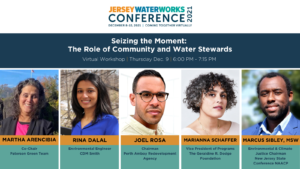The best water solutions derive from collaborations, and community engagement is key
Everyone has a role to play when it comes to water. Water is a precious life-giving resource that must not only be honored and respected, but also managed, treated, and made safe for drinking. While some may think that drinking water and wastewater utility companies are the only ones responsible for this—or perhaps that government officials and decision-makers carry the brunt of the weight (which they do)—community members have important roles to play as well. That was the topic of the Jersey Water Works conference conversation on the evening of Dec. 9 with Martha Arencibia, a co-chair of the Paterson Green Team. “I am a flood victim, and that’s why I became an activist,” said Arencibia. “I had five feet of water—I’ve never been so devastated. The flooding affected the school, our place of worship, and our businesses.”
Tropical storm Ida was another clear reminder of the dangerous effects of climate change. Arencibia recalled the storm’s severe impact on her home and local community. Thirty lives were lost in New Jersey due to the flooding, and people like Arencibia are saying “enough is enough.” She believes that getting everyone involved is key to finding solutions now, not 40 years from today. That’s why she wrote to the governor to advocate for more investment in water infrastructure, and why she participates in volunteer organizations like the Sewage-Free Streets and Rivers campaign. She credits her involvement in the Green Team and the multiple partners that work with them with creating educational programs and action initiatives for her community.
“Our main focus is educating the community on what a CSO (combined sewer overflow) is. We are affected by flooding, and no one understands what a CSO is,” Arencibia said. “We encourage them to adopt a catch basin that collects rainwater—basically committing to keeping it clean.” Check out this video with more information about her community’s efforts, and this article featuring Arencibia and more information about flooding.
Arencibia was joined by Joel Rosa, Chairman of Perth Amboy Redevelopment Agency, who says that “the best solutions derive from community collaborations.” As a municipal staff member with years of experience as an organizer,
Rosa’s approach to this work is to attack the problem—not the people—to find solutions.
He has worked with multiple partners to shape Perth Amboy’s Long Term Control Plans to address the CSO in his community. Both Arencibia and Rosa had worked together under the Citizen’s Campaign in the past.
Water stewards can be found in impacted communities, within municipalities, and also working side by side with utilities. Panel speaker Rina Dalal, Environmental Engineer at CDM Smith, shared that her interest in engaging with communities increased as a result of Hurricane Sandy. She shared that one particular utility found success by engaging the street mayors first, and then enrolling them to help spread the word about how to work with utilities. This deeper level of understanding of the community can supplement existing engagement practices like letters and public meetings. Dalal added that by having people available to answer one-on-one questions during public meetings, community members can get their individual questions answered. This has proven to be helpful in areas where lead service lines are being replaced. This engagement and trust is crucial as residents must allow utility staff to enter their homes to connect new water lines.
Engaging communities was a theme present in various presentations throughout the conference. During the conference plenary, Nicole Miller, Jersey Water Works co-chair, gave an example that in Newark, where she lives, she can identify someone from each neighborhood that she can call on when she needs their input, insight, or help. Nicole is also a member of the Newark Environmental Commission advising the Mayor and City Council on sustainability issues, Chair of the Newark Green Team, and Co-Chair of NewarkDIG (Doing Infrastructure Green), which is dedicated to resilient and sustainable municipal stormwater management.
In addition, conference keynote speaker Colette Pichon Battle, founder and Executive Director of the Gulf Coast Center for Law & Policy (GCCLP), talked about community control funds, an initiative that originated after Hurricane Katrina. The community came together to create a collective decision-making process to get the community’s input on how to manage and use funds. She emphasized how New Jersey and Louisiana have a lot of similarities, including environmental justice issues and damage during Hurricane Ida.
Marcus Sibley, Environmental & Climate Justice Chair from the New Jersey State Conference NAACP, moderated the evening panel and warned that “we must be vigilant so when the funding comes, it goes to the areas that need it most.” Building relationships and being in the room where decisions are made is essential and critical. “We have to push people to do the right thing, to prioritize and earmark funding so that those that need it the most are not left behind,” Sibley said.

Jersey Water Works members know that there are no simple solutions to our water crisis, and that no one entity can create the kind of change needed to transform our water system. For the last seven years, Jersey Water Works members have coordinated efforts and created a platform to share ideas and solutions and push each other to think better, more equitably, and toward the changes we need to see.
Consider joining Jersey Water Works as a member and view the workshop here.
Additional resources:
- Best Practices for Meaningful Community Engagement: Tips for Engaging Historically Underrepresented Populations in Visioning and Planning
- Building Blocks Of Trust: Creating Authentic And Equitable Relationships Between Community Organizations And Water Utilities (new)
- Climate change brings a perfect storm of raw sewage and rainfall in cities that can least afford it (article, features Martha Arencibia)
- Video: Paterson’s Adopt-A-Catch Basin – Sewage-Free Streets and Rivers (https://www.youtube.com/watch?v=tBcmNQ4E6oQ&feature=emb_logo)
- JWW Conference Workshop Resources for Community and Water Stewards – to add your name/resource, please contact info@jerseywaterworks.org.